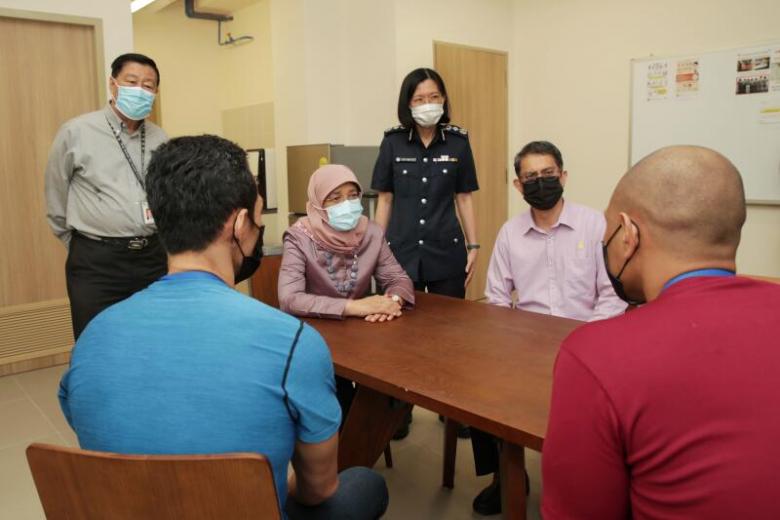SINGAPORE - In line with efforts to better rehabilitate offenders to life outside of prison, Selarang Halfway House began offering a residential and recovery programme for inmates on community-based programmes in January.
Community-based programmes allow suitable offenders to serve the tail end of their sentence in the community, with conditions imposed. Other forms of community-based programmes include home detention and work-release schemes.
Selarang Halfway House, which was initially established to provide a secular residential facility for former offenders on the mandatory aftercare scheme, has taken in 188 supervisees so far this year.
It had 555 residents in 2020, and 494 residents in 2019 on the mandatory aftercare scheme.
On Wednesday (March 24), President Halimah Yacob visited Selarang Halfway House in Changi, where she spoke with some of the 347 residents currently staying there.
One resident who spoke to the President, Daniel (not his real name) said that the programme is helping him to gradually reintegrate into society while serving his seven-year sentence.
"They are teaching us how to adapt and what are the changes that we have to acknowledge and upgrade... It's much better than just going straight outside and not knowing what to do and getting lost," said the 53-year-old who was convicted of drug-related offences.
Daniel and two other residents, Adam, 47, and Fahan, 39, (not their real names) shared how their schedules currently involve going for job interviews, attending digital classes, counselling sessions and playing futsal. They also get to go home to see their families on the weekend.
"I have a gap (of a few years) when I was missing (from my family's lives), so I try to get back all the time I missed with my son," said Adam, whose son is 10.
Research has shown that rehabilitation and reintegration are most effective in a real-life setting, said Ms Karen Lee, director of Community Corrections Command from the Singapore Prison Service.
She added that helping inmates with their reintegration into society would play a part in reducing recidivism, or reoffending in the first two years after a person's release.
The annual statistics from Singapore Prison Service in February revealed that the overall recidivism rate hit a record-low of 22.1 per cent for the cohort released in 2018. In comparison, the rate was 24 per cent for the cohort released in 2017.
The public can also play a part to help offenders remain crime-free, said President Halimah in a Facebook post about her visit.
"We, as a caring and inclusive society, must continue to create opportunities for ex-offenders who hope to improve their lives by strengthening key reintegration factors such as accommodation, employment, family and social support, and motivate them to make positive and lasting changes to their lives," she wrote.


